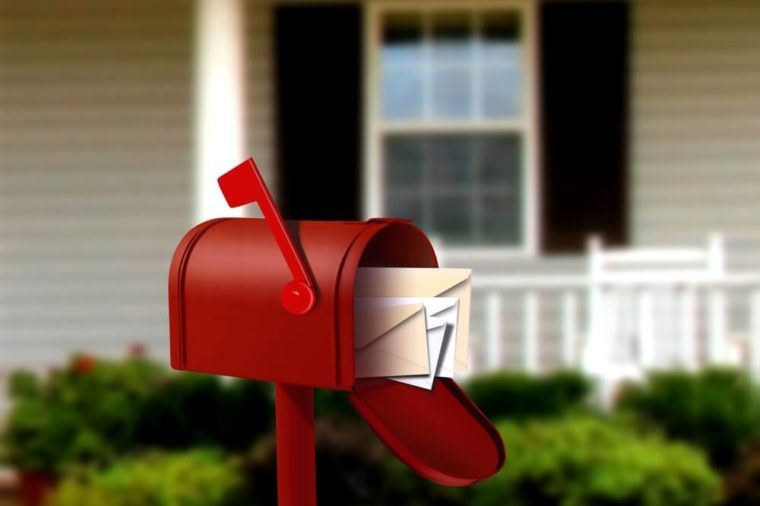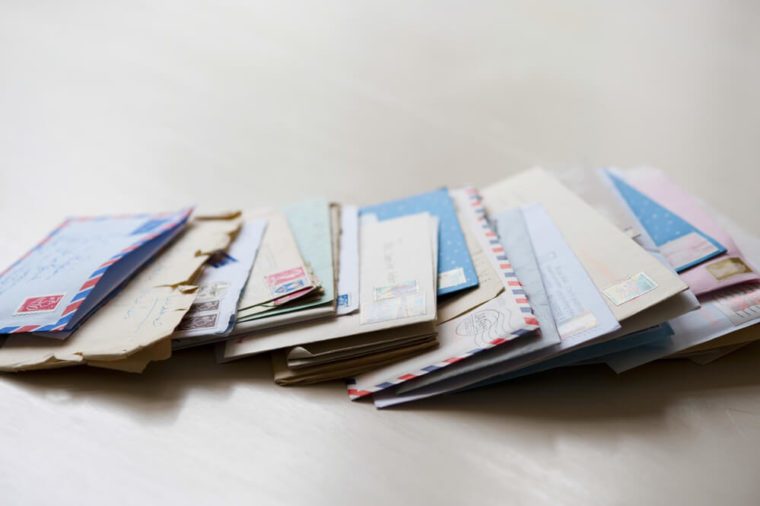Why so much junk mail?

What’s wrong with junk mail?
Junk mail comes at a huge cost to our quality of life. Sorting, reading, and recycling junk mail takes time away from your daily activities, not to mention creating a mess—declutter your life with these tips from the pros. Not convinced it’s a big intrusion? According to EcoCycle.org, one of the largest non-profit recyclers in the USA, you could spend up to eight months of your life dealing with junk mail. And there are actual threats to this mailbox onslaught: Junk mail exposes your private info by sharing your name, address, and purchasing habits with marketers around the country. And all those credit card offers could put you at risk of identity theft.
And then there’s the ecological impact: Here are some horrifying facts from New York University School of Law about junk mail and sustainability:
- 5.6 million tons of catalogs and other direct mail advertisements end up in U.S. landfills annually.
- 44 percent of junk mail is thrown away unopened, but only half that much junk mail (22 percent) is recycled.
- The average American household receives 848 pieces of junk mail per household, equal to 1.5 trees every year—more than 100 million trees for all U.S. households combined.
- Junk mail destroys 100 million trees a year—the equivalent of deforesting all of Rocky Mountain National Park every four months.
- Largely due to deforestation, junk mail manufacturing creates as much greenhouse gas emissions annually as 3.7 million cars.
- Americans pay 370 million annually to dispose of junk mail that does not get recycled.
Concerned about the environment and sustainability? Here are 25 ways you can reduce your own carbon footprint.
To stop junk mail, understand why you get it in the first place
First and foremost, junk mail is the creature of large direct mail companies who enter into reduced postage rate arrangements with the USPS in order to send massive amounts of paper catalogs, solicitations, coupons, postcards and flyers to mailing addresses across the nation, according to USJunkMail.com, a service that can help reduce the volume of junk mail in your mailbox. The way the senders of junk mail get your address is from public records, phone directories, club memberships, credit applications, and even the USPS, itself. Direct Mail and the Data & Marketing Association, also known as the DMA are two of the largest providers of consumer information to direct marketers.
Content continues below ad
If the proper postage is affixed, the USPS is legally required to deliver that junk. However, you also have some legal rights to turn off the junk-mail hose.
Opt out of credit and insurance offers

To opt out for five years: Call toll-free 1-888-5-OPT-OUT (1-888-567-8688) or visit www.optoutprescreen.com. The phone number and website are operated by the major consumer reporting companies.
To opt out permanently: You may begin the permanent Opt-Out process online at www.optoutprescreen.com. To complete your request, you must return the signed Permanent Opt-Out Election form, which will be provided after you initiate your online request.
When you call or visit the website, you’ll be asked to provide some personal information, including your home telephone number, name, Social Security number, and date of birth. The information you provide is confidential and will be used only to process your request to opt out. For those without internet access, a written request can be made to each of the major consumer reporting companies, although you should be aware that the request will need to include not only your name but also your social security number, phone number, and date of birth. Do you know what your social security number reveals about you?
Here are the addresses for the major reporting companies:
Experian
Opt Out
P.O. Box 919
Allen, TX 75013
TransUnion
Name Removal Option
P.O. Box 505
Woodlyn, PA 19094
Equifax, Inc.
Options
P.O. Box 740123
Atlanta, GA 30374
Innovis Consumer Assistance
P.O. Box 495
Pittsburgh, PA 15230
Opting out of these offers will have no effect on your ability to apply for or obtain credit or insurance, according to the FTC. Please be sure to review these ways to prevent identity theft in the wake of the recent Equifax breach.
Opt out of direct mail
According to our sources at NYU Law School, Direct Mail has a free opt-out service available here. By completing the online “National Do Not Mail List” form, you can indicate if there are any types of mailings you would like to receive from the list provided. DirectMail.com will then contact you every six months via e-mail so you can review and update your preferences.
DMA charges a handling fee in order to opt out of the mailings for which they’ve provided your consumer information. If you register online, the handling fee is $2. To use the mail-in option, send your opt-out request (“I do not wish to receive any unsolicited advertising, sales or other mail solicitations at this address”), along with your name (and all variations thereof), address, and signature along with a $3 processing fee (check or money order payable to DMA) to:
DMAchoice
Data & Marketing Association
P.O. Box 643
Carmel, NY 10512
According to our sources at NYU School of Law, neither Direct Mail nor DMA can guarantee your name will be removed from every mailing list on which it appears. In addition, DMA offers registration for its eMail Preference Service (reduce your unsolicited commercial email), but you can make a big dent on getting rid of junk email just by taking this advice.
Content continues below ad
Opt out of catalogs
When you order something from a catalog, your name and address are likely given to Abacus, an alliance of catalog and publishing companies. To have your information removed from Abacus, contact them with your name (including any middle initial), current address, and previous address if you moved recently. Abacus can be reached either via e-mail (abacusoptout@epsilon.com) or by mail (Abacus, Inc,. PO Box 1478, Broomfield, CO 80038). Abacus also has a website that can help remove you from some (but not all) of their catalogs.
In addition, there is a service called Catalog Choice, a free service that allows you to cancel specific catalogs (and other types of paper mail) you no longer wish to receive. To find out if the junk catalogs you’re receiving can be opted-out through Catalog Choice, you simply type in the name into Catalog Choice’s search engine. Although the service is free and not-for-profit, they do accept donations via their website.
Opt out of magazine subscription offers

Opt out of (additional) requests for donations from charities
We know you like donating to worthy causes, but maybe you’d like to take some control over all the requests for additional donations. The American Institute on Philanthropy offers the following tips on reducing junk mail and solicitations from charities:
- When you give money to a charity or nonprofit group, enclose a note requesting that the organization not rent, sell or exchange your name, address, and giving history with anyone else. You can make future contributions contingent on the charity honoring your request. Click here for a sample note.
- If you wish to donate to a charity once per year, ask the charity to decrease the frequency of its mailings.
- If you do not wish to support a charity, ask the charity to delete your name from its mailing lists.
Refuse delivery of (certain) promo mailings
First, look for any of the following phrases on any promotional mailing sent to “resident,” “current resident,” or “current occupant”:
- return service requested
- forwarding service requested
- address service requested
- change service requested
- First Class Mail
You can mark these envelopes “RETURN TO SENDER,” and put them right back in your mailbox.
We assume you won’t be returning your holiday cards to their senders, but what to do with them when the holidays are over? Here are some new uses for old Christmas cards.
Stop-gapping

- Cox Target, which is responsible for sending you those promo-coupon-filled Valpaks, among other things.
- Red Plum (another promo-coupon mailing)
But you should also pay attention to other unwanted mailings that seem to have slipped through the cracks despite your other efforts, and then contact the senders of those mailings individually.
Publishers Clearinghouse Sweepstakes
To opt out of this major sweepstakes mailer, contact: Publishers Clearing House: Online, e-mail, or by mail to Consumer & Privacy Affairs, Publishers Clearinghouse, 382 Channel Drive, Port Washington, NY 11050. There may be sweepstakes in which you’re interested in participating, however. For example, you may be interested in these sweepstakes offered by Reader’s Digest.
Make sure the junk mail stays away
Contact your banks, credit card companies, and utilities and tell them not to release your name, address, Social Security number, e-mail address, or phone number to anyone for any type of marketing or promotional reasons. If you decide to do this in writing, do so without giving out any information other than the name on your account, and keep a record.
And if you’re with one of these credit card companies, you might want to think twice about “what’s in your wallet”.
The post This Is How You Can Stop Getting So Much Junk Mail—for Good appeared first on Reader's Digest.
from Reader's Digest http://ift.tt/2GtfGWT
ليست هناك تعليقات:
إرسال تعليق